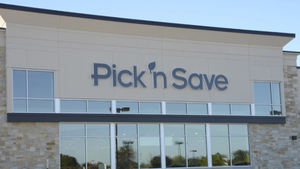SALMON GROUP ANGLING FOR JUMP IN SALES
A salmon processors group is building sales momentum with a generic advertising campaign.The group, called Salmon Marketers International, based in Vancouver, British Columbia, said it has run a four-week generic promotion twice in two markets, San Francisco and the Washington/ Baltimore areas. The first promotion, run last fall, led to double-digit sales increases, it said. The second was just completed,
April 10, 1995
LAURA KLEPACKI
A salmon processors group is building sales momentum with a generic advertising campaign.
The group, called Salmon Marketers International, based in Vancouver, British Columbia, said it has run a four-week generic promotion twice in two markets, San Francisco and the Washington/ Baltimore areas. The first promotion, run last fall, led to double-digit sales increases, it said. The second was just completed, and the sales results are not yet in.
The themed campaigns, using the slogan, "Salmon: From Only the Best Schools," were centered on humorous radio spots and use of in-store point-of-sale materials.
Area retailers each received customized kits containing promotional materials that would be suitable for individual stores. Items available included posters, recipe tear pads, ice picks, easel back displays and ad slicks.
A buyer for Lucky Stores northern California division in San Leandro said the chain ran some advertisements in conjunction with the campaign.
"They did have lots of point-of-purchase materials. In the fall promotion we did put a few of those items in the store. But not for the second promotion," said Ellie Willoughby, seafood buyer at Lucky.
The primary reason Lucky didn't use the materials for the second promotion was space limitations, she said.
Whether Lucky's sales increased due to the promotion is uncertain, because the company didn't track movement during those specific time periods, she said.
But she added that campaigns like that probably do generate interest among consumers. If the campaign is run again, Lucky would consider tying into it again, said Willoughby.
Gerry Fowlie, marketing director for SMI, said market sales grew 49% in the San Francisco market, while Washington sales rose about 20%. He said the campaign was created through a consortium of farmed salmon producers from Washington state, British Columbia, Chile, Scotland and Norway who formed a consortium last year for the specific purpose of launching the $1 million [Canadian dollars] campaign.
Fowlie said one San Francisco area retail chain, which ran additional advertising to tie-in to the campaign, increased its salmon sales by 300%.
He said SMI hopes to sponsor a third event later this year.
He said post-campaign research showed "that consumers like fresh salmon and by reminding them of the taste, nutritional benefits and simplicity of preparation, it increases their intention to buy salmon." U.S. salmon per capita consumption is less than one pound per year, according to SMI.
At the Boston Seafood show last month, SMI held a meeting to discuss the generic ad campaign and generate retailer enthusiasm for the program.
He said the idea behind creating the campaign began last year as a way to increase consumption of salmon. "All salmon farmers are fighting over the same buyers. So a lot of effort was used in fighting over those same buyers. It dawned on us to expand the pie instead.
"We have a product that will respond well to generic advertising, and we have a product that the consumer likes."
Rose Welsh, director of industry promotions for Tri-Foods International, Apopka, Fla., which worked with SMI on the promotion as the contact to retailers, described the event as "very successful."
"The only stores that didn't do well were ones that don't normally sell too much seafood," said Welsh.
Some of the retailer participants included Giant Food, Landover, Md.; Oakland, Calif., and Baltimore divisions of Safeway; Lucky Stores division based in San Leandro, Calif.; Shoppers Food Warehouse, Lanham, Md.; Cala Foods, La Habra, Calif.; Nob Hill General Stores, Gilroy, Calif.; Basics & Metro, Randallstown, Md., and the Baltimore division of Montvale, N.J.-based A&P.
The radio ads attempted to tap into the perception that salmon is a "smart food," said Fowlie. One spot that ran in the Washington area suggested that after one consumer ate salmon, he learned how to spell potato -- a take-off on former Vice President Dan Quayle's well-known spelling blunder. In a San Francisco spot, a consumer was able to program his videocassette recorder after consuming salmon.
About the Author
You May Also Like




